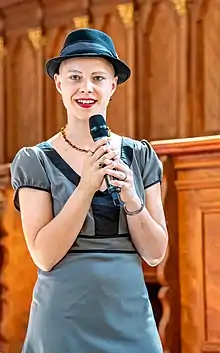Anna-Maria Hefele
Anna-Maria Hefele is a German overtone singer. Hefele is from Grafing near Munich.[1]


This technique of singing polyphonic overtones is also known as "throat singing," and Hefele has been practicing it since 2005.[2]
There are several styles of overtone singing found around the world. Canadian Inuit and several forms displayed in Mongolia and surrounding regions are the most recognized. Hefele's style is culturally practiced in the Siberian region of Tuva. This whistling vocal version is called sygyt.[3]
The Huffington Post has commented on her "amazing ability" and her singing being "utterly bizarre".[4] On 10 October 2014, she was number two on The Guardian's Viral Video Chart,[5] with one online video titled Polyphonic Overtone Singing, which features Hefele as she demonstrates and explains overtones. As of December 2020, this video has received more than 17.6 million hits.
References
- "Obertonsängerin Anna-Maria Hefele Eine Stimme wie nicht von dieser Welt". Br.de. Archived from the original on 12 October 2014. Retrieved 12 October 2014.
- Fitzharris, Mia. "Throat Singer's Performance Goes Viral". Yahoo News. Retrieved 12 October 2014.
- Christopher Hooton (6 October 2014). This woman singing multiple notes at once is a total 'I didn't even know humans could do that' moment. The Independent. Accessed October 2014.
- "German Musician Anna-Maria Hefele Demonstrates Polyphonic Overtone Singing, And It's Amazing". Huffington Post. Retrieved 12 October 2014.
- Perraudin, Frances (10 October 2014). "Viral Video Chart". The Guardian. Retrieved 12 October 2014.
External links
- Official website
- YouTube: Polyphonic Overtone Singing-Anna-Maria Hefele
- Hefele, Eklund & McAllister (2019). Polyphonic Overtone Singing: an acoustic and physiological (MRI) analysis and a first-person description of a unique mode of singing. In: Mattias Heldner (ed.): Proceedings from Fonetik 2019, 10–12 June 2019, Stockholm, Sweden. PERILUS XXVII, ISSN 0282-6690, ISBN 978-91-7797-984-5 (print version), ISBN 978-91-7797-985-2 (electronic version), doi:10.5281/zenodo.3246011, pp. 91–96.